Unless you have raised cows for a number of years, you might not be clear on exactly how much feed you should give to your cows. After all, cows are large animals with unique needs. Feeding them improperly or according to the needs of other animals on your farm could end up being a mistake.
Are your cows getting enough to eat?
Your cows are getting enough to eat if they are able to maintain a healthy weight. Signs of poor nutrition can include weight loss, lack of activity, and poor hair coat.
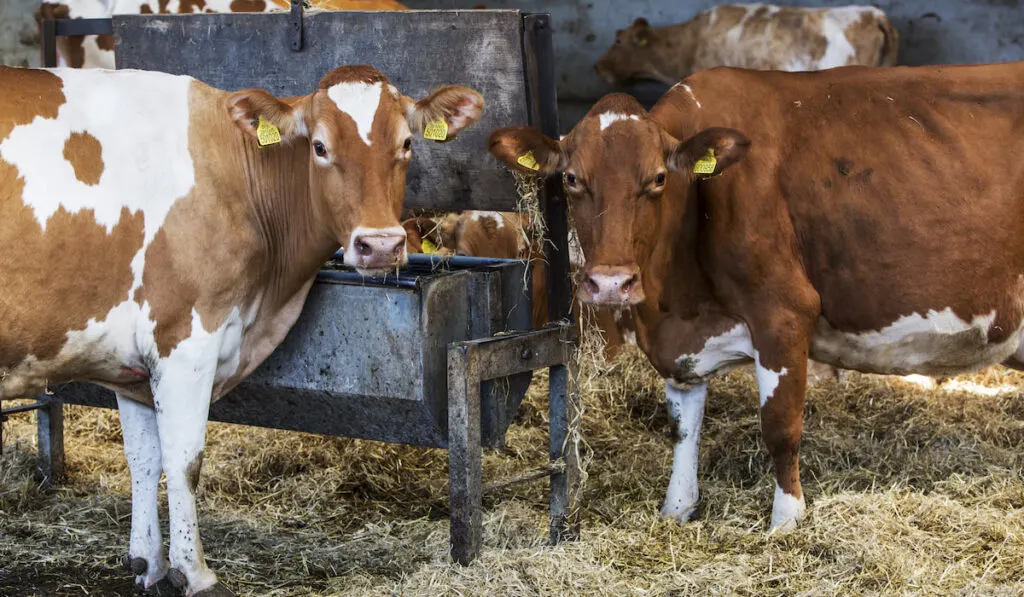
How much and what kind of feed you give your cows can vary depending on the breed and type of cow.
If you are not careful or familiar with your cows, it is possible that you could over or under feed them.
While it can vary based on type, breed, and the feed itself, the amount of feed cows need daily can range from 24-60 pounds of dry feed or 50-120 pounds of wet feed.
How can you be more confident about the frequency and kind of feed you give your cows? Let’s take a look at factors that can impact when, how, and what you feed your cows daily.
Table of Contents
How Much Feed Should Your Cows Eat Daily?
The amount of feed you should give your cows each day depends on factors such as breed, type (dairy vs. meat), and whether the cow is pregnant or nursing.
Meat Cows
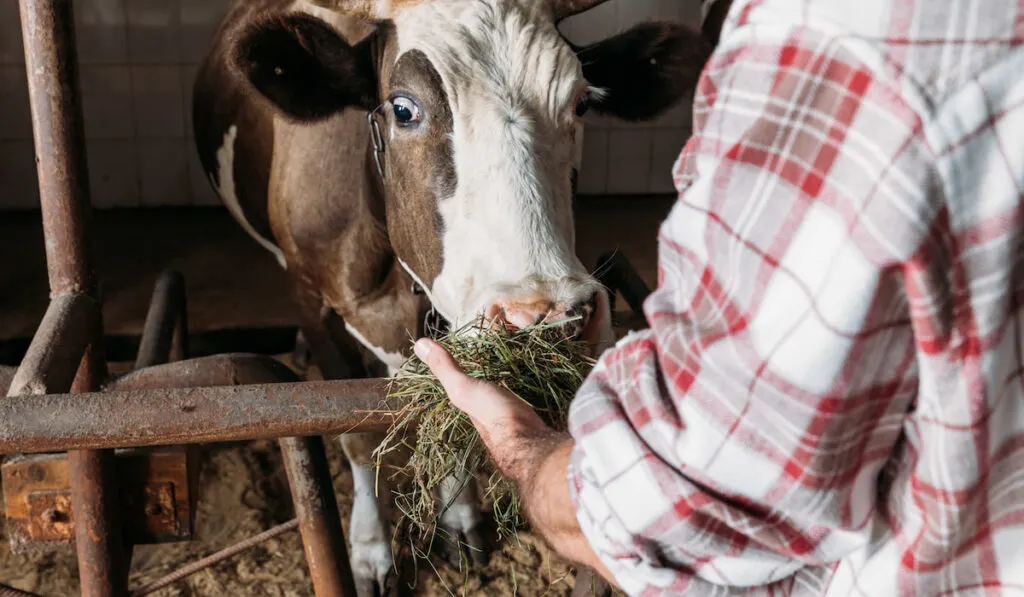
Meat cows are raised purely for meat production and are expected to grow very large and fat. Examples of meat cow breeds include:
- Brangus
- Angus
- Hereford
- Brahman
- North Devon
Meat cows are usually allowed to graze because they can gather enough feed and nutrients from the grass.
In winter months or periods when pastures are depleted, you should give meat cows at least 24 pounds of dry feed or 60 pounds of fresh feed daily.
Wet feed is made up mostly from fresh grass and other feed that has not been processed to remove moisture. Dry feed can include hay and other processed feed with low or no moisture.
Dairy Cows
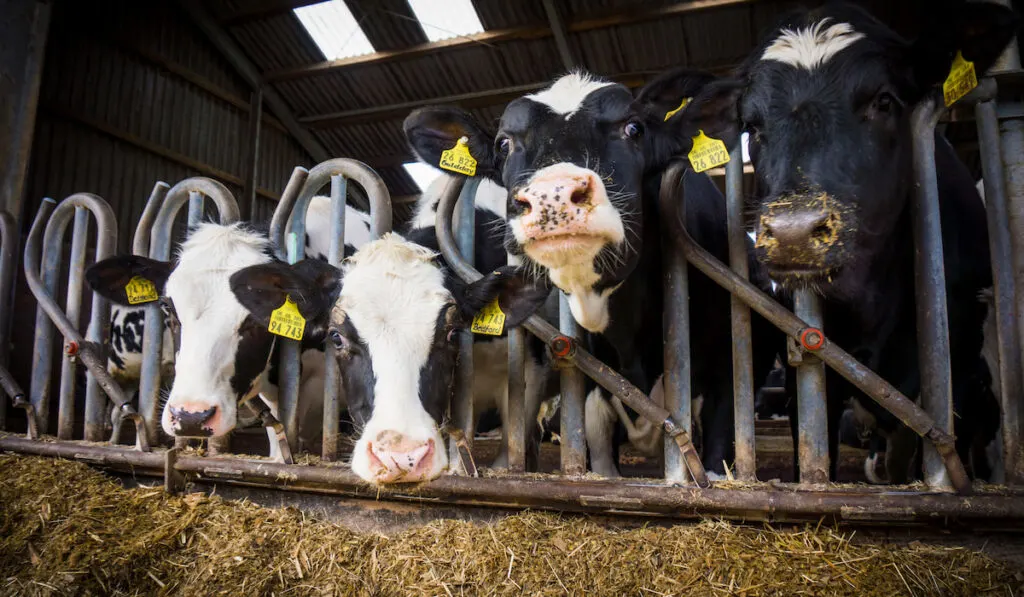
Dairy cows are kept for their milk production. They are bred to produce sufficient milk to feed their young with extra for human collection and consumption. Examples of dairy cow breeds are:
- Shorthorn
- Jersey
- Simmental
- Brown Swiss
- Holstein Friesian
When lactating, dairy cows need 110-120 pounds of wet feed or 50-55 pounds of dry feed daily.
The more milk you want your cows to produce, the more feed you have to provide to them. Dairy cows will benefit from more protein-rich grains because these encourage greater milk production.
Pregnant Cows
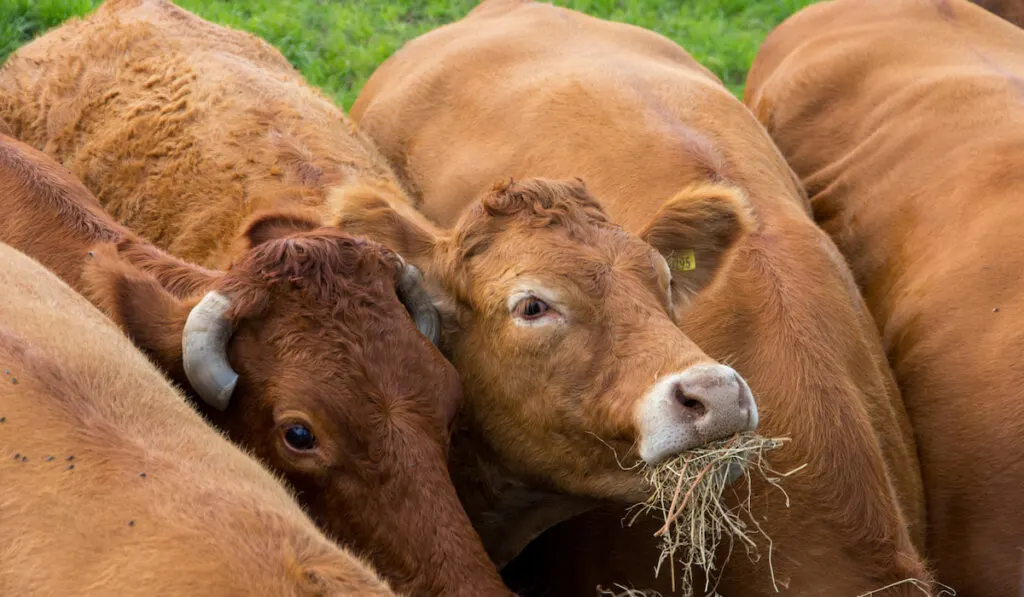
Both meat cows and dairy cow can become pregnant. If your cow is expecting, are you expected to feed them differently?
You should add extra 5-10 pounds of dry feed or 15-30 pounds of wet feed daily to the feed regimen of your pregnant cows.
If the cows are grazing, you can give them extra feed as a supplement. This will help them take in the necessary nutrients for healthy offspring.
Can You Overfeed Cows?
Cows can certainly eat more than they need. While this can happen occasionally when grazing, giving your cows extra feed or feed that contains excessive amounts of protein and fat can result in overfeeding.
As ruminant animals, cows have bacteria in their rumen that help breakdown the food they eat into digestible materials.
Cows and other ruminant animals can digest cellulose, or dietary fiber, which other animals cannot.
While digesting food from their rumen, some of the protein-rich microbes are digested as well, giving cows an extra and natural protein source.
This is why cows and other ruminant animals can grow big and healthy even if they only eat grass and hay.
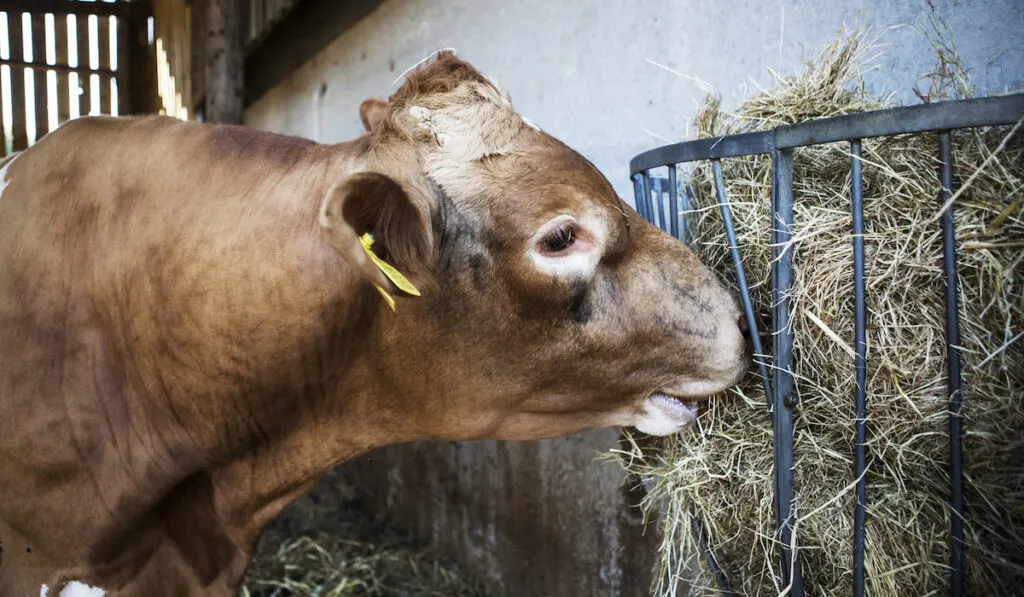
Since cows are ruminants, giving them too many extra grains and other feed with high protein content is not necessary.
Cows can maintain sufficient protein levels even from plant-sourced feeds that have seemingly low protein content.
You do not have to give your cows extra grains unless they are dairy cows, pregnant, or being intentionally fattened up.
In these instances, your cows will need the extra protein to produce meat, milk, and healthy calves.
How to Fatten Up a Skinny Cow
If you have a skinny cow that needs fattening, either for health reasons or future human consumption, there are a few ways you can help them pack on the pounds.
Try Different Varieties of Grass and Hay
Different varieties of grass and hay have different nutritional compositions. Your cow could be underweight if the grass or hay they graze on is not nutritionally dense or plentiful.
Try different types of grass and hay to determine whether a change in diet makes an impact.
Feed Your Cows Intensively
If you want your cow to gain weight, make sure that it never runs out of food. Grazing cows may need to wait for grass to recover and grow back in their pasture before they can get sufficient natural feed.
You should maintain at least 1.8 acres of land per cow to ensure ample space and feed for grazing.
If your property is not large enough to accommodate all of your cows, consider reducing the number of cows. You can also monitor the health of the grazing land and provide an extra source of grass and hay.
Give Your Cows Feed Supplements
Grass, hay, and silage should be sufficient for cows to grow fat and healthy. However, you can give your cows supplementary diets by adding grains, vitamins, and minerals to their diet.
Inspect and Treat Your Cows of Parasites
You should inspect your cows for visible parasites and parasite symptoms to ensure their lack of weight gain is not caused by an illness. Call your veterinarian to deworm your cows if they are affected.
Most internal parasites can cause injuries in your cows and compete with your cows for nutrients. A large number of parasites can make your cows look skinny and sick.
Examples of common parasites that can affect cows include:
- Lice
- Mites
- Warbles
- Liver Flukes
- Tapeworms
- Roundworms
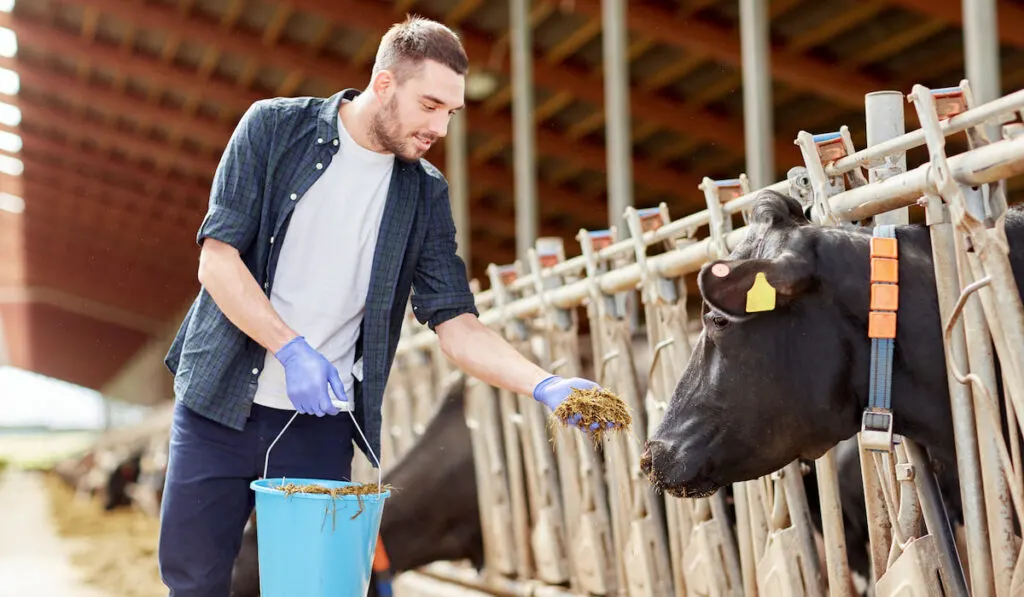
Choosing the Best Feed for Your Cows
Cows thrive the most when allowed to graze for grasses and hay as the main staples of their diet. Whether you are trying to fatten up your cows or supplement their diet during times when natural supplies are low, you can choose from a variety of feed options including:
- Hay
- Grass
- Silage
- Alfalfa
- Grains
Great grains for cows include:
- Oat
- Corn
- Barley
- Soybean
Final Thoughts
Cows should eat sufficient feed daily to produce meat, milk, and healthy calves. Cows naturally get most of their feed and nutrients through grazing, and it is important to pay attention to differences in breed and type before adding foods to their diet.
Remember to monitor their pastures for ample supplies and remain aware of their health to avoid malnutrition and illness as causes for weight loss.
Sources
- https://www.hobbyfarms.com/how-to-make-grassfed-cattle-gain-weight-3/
- https://dairy-cattle.extension.org/how-many-pounds-of-feed-does-a-cow-eat-in-a-day/
- https://beef.unl.edu/cattleproduction/forageconsumed-day
- https://www.johnson.k-state.edu/crops-livestock/agent-articles/cattle-feeding.html
- https://dairy-cattle.extension.org/internal-parasites-in-beef-and-dairy-cattle/
